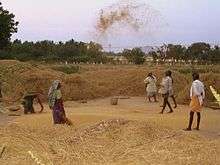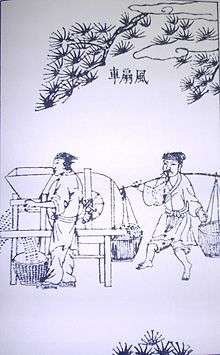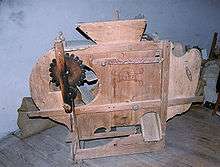Winnowing


Wind winnowing is an agricultural method developed by ancient cultures for separating grain from chaff. It is also used to remove hay and chaff or other pests from stored grain. Threshing, the loosening of grain or seeds from the husks and straw, is the step in the chaff-removal process that comes before winnowing.
In its simplest form it involves throwing the mixture into the air so that the wind blows away the lighter chaff, while the heavier grains fall back down for recovery. Techniques included using a winnowing fan (a shaped basket shaken to raise the chaff) or using a tool (a winnowing fork or shovel) on a pile of harvested grain.
In Greek culture
The winnowing-fan (λίκνον [líknon], also meaning a "cradle") featured in the rites accorded Dionysus and in the Eleusinian Mysteries: "it was a simple agricultural implement taken over and mysticised by the religion of Dionysus," Jane Ellen Harrison remarked.[1] Dionysus Liknites ("Dionysus of the winnowing fan") was wakened by the Dionysian women, in this instance called Thyiades, in a cave on Parnassus high above Delphi; the winnowing-fan links the god connected with the mystery religions to the agricultural cycle, but mortal Greek babies too were laid in a winnowing-fan.[2] In Callimachus' Hymn to Zeus, Adrasteia lays the infant Zeus in a golden líknon, her goat suckles him and he is given honey.
In the Odyssey, the dead oracle Teiresias tells Odysseus to walk away from Ithaca with an oar until a wayfarer tells him it is a winnowing fan (i.e., until Odysseus has come so far from the sea that people don't recognize oars), and there to build a shrine to Poseidon.
In China

In Ancient China the method was improved by mechanisation with the development of the rotary winnowing fan, which used a cranked fan to produce the airstream.[3] This was featured in Wang Zhen's book the Nong Shu of 1313 AD.
In the Old Testament
In the Old Testament the word winnow is used in several verses in different books in the New International Version while other versions of the bible translate the action as "fan", "throw" or the separating tool as "pitchfork", "shovel", "winnowing fan", or "winnowing instrument".
Ruth 3:2 "Now Boaz, with whose women you have worked, is a relative of ours. Tonight he will be winnowing barley on the threshing floor."
Proverbs 20:8 "When a king sits on his throne to judge, he winnows out all evil with his eyes."
Proverbs 20:26 "A wise king winnows out the wicked; he drives the threshing wheel over them."
Isaiah 41:16 "You will winnow them, the wind will pick them up, and a gale will blow them away. But you will rejoice in the Lord and glory in the Holy One of Israel."
Jeremiah 4:11 "At that time this people and Jerusalem will be told, “A scorching wind from the barren heights in the desert blows toward my people, but not to winnow or cleanse;"
Jeremiah 15:7 "I will winnow them with a winnowing fork at the city gates of the land. I will bring bereavement and destruction on my people, for they have not changed their ways."
Jeremiah 51:2 "I will send foreigners to Babylon to winnow her and to devastate her land; they will oppose her on every side in the day of her disaster."
In the New Testament
In Matthew 3:12, a sentence introduces the separation of wheat and chaff (good and bad) by "His winnowing fan is in his hand" (American Standard Bible and New American Bible translation). The New International Version, the New Revised Standard Version and the New American Standard Bible translate the term as "winnowing fork"; the Holman Christian Standard Bible translates it as "winnowing shovel".
In Europe
_008.jpg)
In Saxon settlements such as one identified in Northumberland as Bede's Ad Gefrin [4] (now called Yeavering) the buildings were shown by an excavator's reconstruction to have opposed entries. In barns a draught created by the use of these opposed doorways was used in winnowing.[5]
The technique developed by the Chinese was not adopted in Europe until the 18th century, when winnowing machines used a 'sail fan'.[6] The rotary winnowing fan was exported to Europe, brought there by Dutch sailors between 1700 and 1720. Apparently they had obtained them from the Dutch settlement of Batavia in Java, Dutch East Indies. The Swedes imported some from south China at about the same time and Jesuits had taken several to France from China by 1720. Until the beginning of the 18th century, no rotary winnowing fans existed in the West.[7]
In the United States
The development of the winnowing barn allowed rice plantations in South Carolina to increase their yields dramatically.
Mechanization of the process

In 1737 Andrew Rodger, a farmer on the estate of Cavers in Roxburghshire, developed a winnowing machine for corn, called a 'Fanner'. These were successful and the family sold them throughout Scotland for many years. Some Scottish Presbyterian ministers saw the fanners as sins against God, for wind was a thing specially made by him and an artificial wind was a daring and impious attempt to usurp what belonged to God alone.[8] As the Industrial Revolution, the winnowing process was mechanized by the invention of additional winnowing machines, such as fanning mills.
See also
References
| Wikimedia Commons has media related to Winnowing. |
- ↑ Harrison, Prolegomean to the Study of Greek Religion, 3rd ed. (1922:159).
- ↑ Karl Kerenyi, Dionysus: Archetypal Image of Indestructible Life (1976:44).
- ↑ The Question of the Transmission of the Rotary Winnowing Fan from China to Europe: Some New Findings, Hans Ulrich Vogel, 8th International Conference on the History of Science in China
- ↑ Münzenberg, Hessen. Chapel and Palas (G.Binding, Burg Münzenberg, 1962)
- ↑ M.W.Thompson, The Rise of the Castle, (Cambridge University Press, 1991), 5–6.
- ↑ Broadcasting and winnowing, Antique Farm Tools
- ↑ Robert Temple, The Genius of China, p. 24
- ↑ Chambers, Robert (1885). Domestic Annals of Scotland. Edinburgh : W & R Chambers. p. 397.
External links
![]()